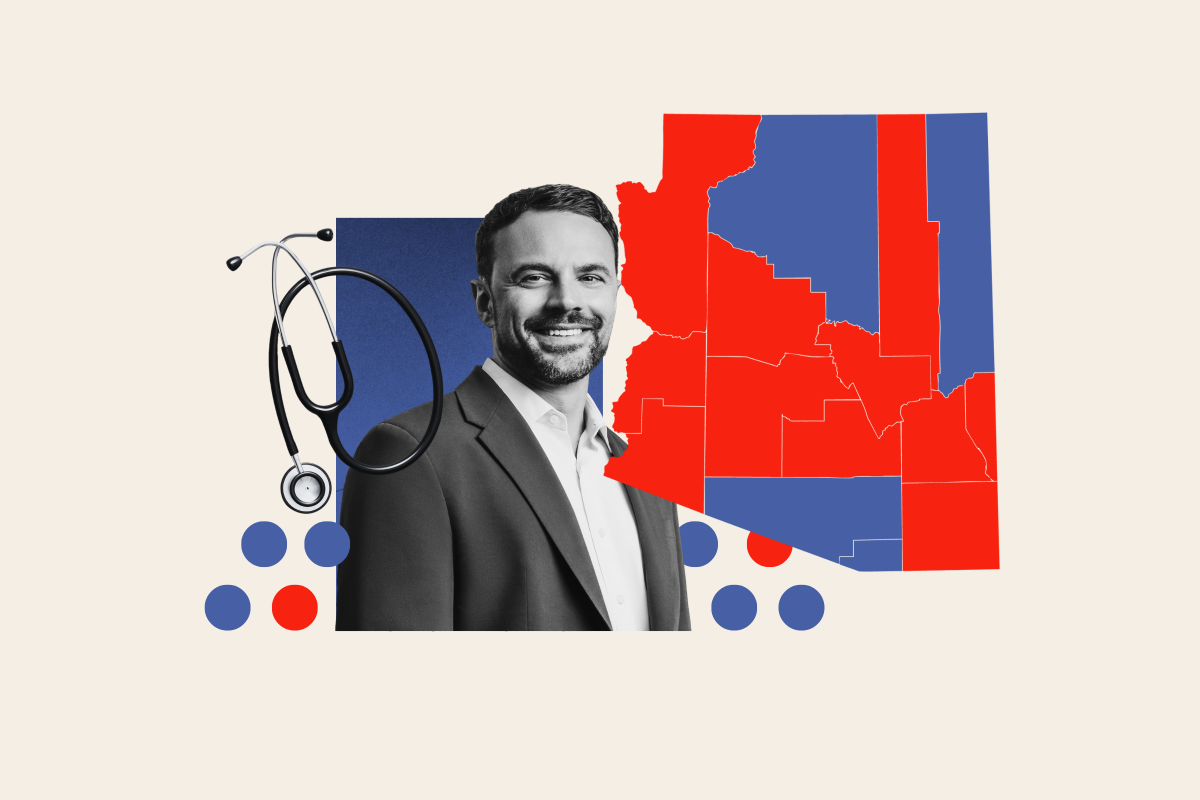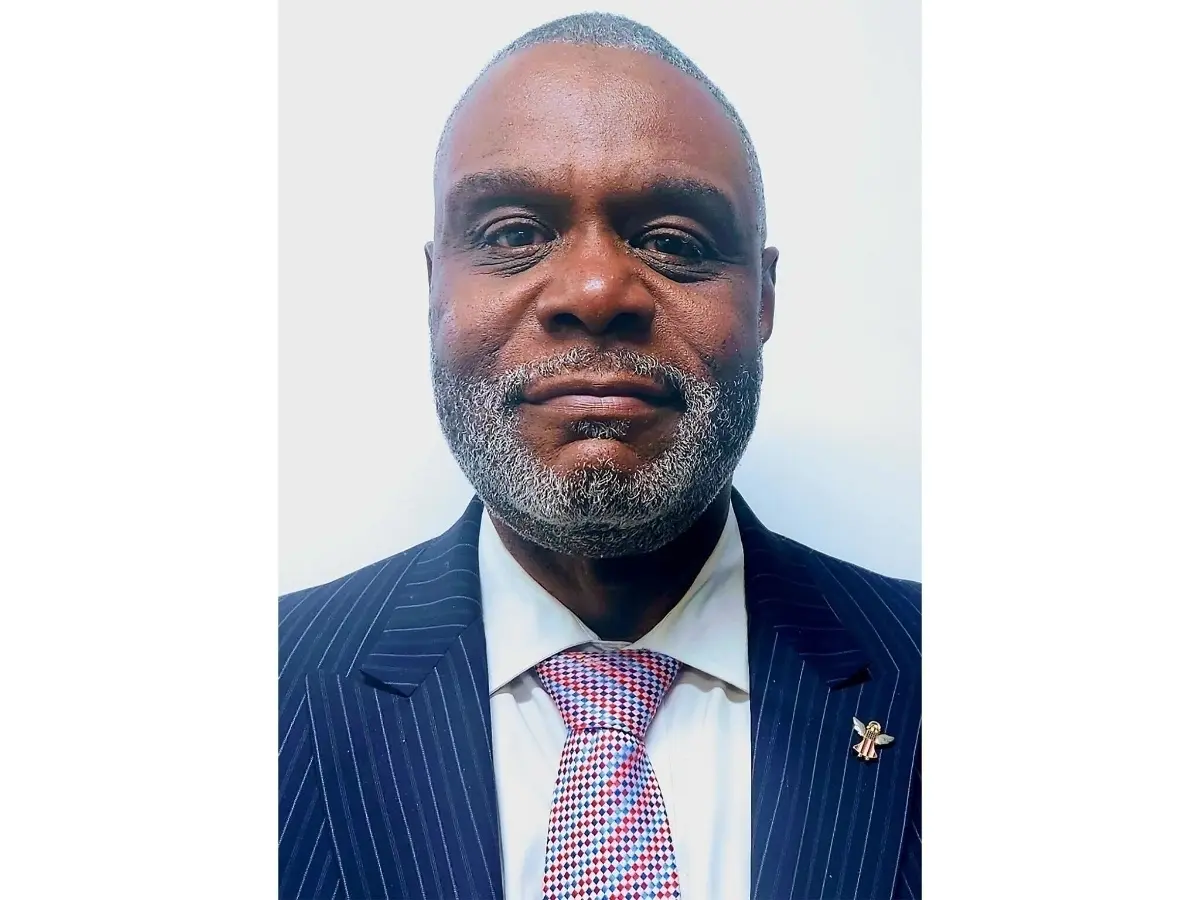
Jonathan Treble’s emphasis on health care in his campaign for a battleground Arizona congressional seat is personal, as he has had his own difficult experience with health insurance, he told Newsweek in an exclusive interview.
Why It Matters
Treble is running in Arizona’s 1st Congressional District, a seat currently held by Republican Representative David Schweikert. The Maricopa County-based seat is one of the most competitive in the country, having voted for former President Joe Biden in 2020 and President Donald Trump in 2024. It’s a top Democratic target, and Treble is hoping to prevail in the primary against several other well-known Democrats.
He told Newsweek issues of health care and affordability are at the top of mind for voters in swing seats like his own, and that his business background has prepared him to serve in Congress.
What To Know
Treble, the founder and CEO of WithMe, Inc., a company that manages office amenities like printing and coffee, said he has thought about running for office for a long time, but decided to do so after he was diagnosed with a blood growth in his brain that required lifesaving surgery.
“This was in a very emergent situation. I went through the process. I struggled with insurance to pay for a lot of the early steps,” he said.
The experience provided him with a new perspective, he said.
“Both in my life from an existential perspective that I wanted to do more in life, but also from the basis of, if I’m struggling with health care as somebody who has paid into this system for so long, and then the moment I need it, it is not showing up for me. I couldn’t stop thinking about how many millions of Americans are having the same exact experience,” he said.
Democrats have emphasized health care as a major issue, particularly following Medicaid cuts in Trump’s One Big Beautiful Bill. Democrats are united in opposition to those cuts and have pushed for more health care funding in an ongoing legislative battle for a temporary funding bill. However, there are still divisions within the party—while some progressives have called for a single-payer system, more moderate Democrats have advocated for changes to the Affordable Care Act to improve access.
Treble said he is for “whatever gets more access for more people,” and he supports “ideally universal health care.”
“We absolutely need to bring the cost down for people. People are really struggling with health care costs and that’s your copays when you go to the doctor, those have gone up, premiums, even when you get a prescription drug,” he said.
Jonathan Treble’s Plan to Flip Key Arizona District
Treble will have to prevail in a crowded Democratic primary and a general election to secure a spot in Washington, D.C., and he believes he is in a strong position to do so.
“We need to have a strong candidate who can appeal to a wide swath of voters, and as a businessperson who is a lifelong Democrat with Democratic values, I can both galvanize the base of Democrats who are ready to go out to the polls, are frustrated with where this country is headed and are ready to make a change. And I can also galvanize the independents and dare I say the moderate Republicans who are not really happy with how the last nine months are shaking,” he said.
Arizona, like much of the country, shifted to the right last November. It was, in fact, the swing state that moved the farthest to the right since 2020. Biden carried it by less than half a percentage point, but Trump won it by 5.5 points in 2024. Trump did so by performing better in places like Phoenix and Tucson, as well as winning over a higher percentage of Hispanic voters in the state.
Winning back those voters will be key for Treble and other Democrats hoping to make a comeback in the state next year.
Treble said Democrats had a “messaging” problem in 2024, calling on the party to “focus on what people care about.” The affordability crisis, he said, has even hit more “affluent” districts like his own as voters struggle to pay for education and health care.
“We as Democrats need to really talk about affordability, which is a kitchen table item that families are absolutely talking about every day and every night. Just the cost of things are way too high. President Trump has not done anything except make the problem worse with his tariff agenda,” he said.
Treble Believes Business Background Would Be an Asset in Congress
Treble said his business background would help prepare him to tackle issues of affordability in Congress.
Members of Congress must be focused on delivering “real results from the government to people at a price point, at a cost that is superior to what you can get elsewhere,” he said.
“I really think that the innovation that I’ve done in the private sector can translate well to really innovating within government to find ways to deliver services at a more efficient cost,” he said.
Treble also said his business experience allows him to understand how tariffs are affecting business owners across the country.
“I was not budgeting to have to pay a lot more for coffee beans or the supplies that I bring in from overseas that are necessary to run my business and necessary to runs thousands of businesses in Arizona, by the way. I’ve talked to real businessowners in my district who are not happy about having to pay these extra taxes,” he said.
He said this will also help him on the campaign trail over the coming months.
“The common thread between both is that if you’re going to create a successful business, you have to be really good at listening to your customers. That is how you evolve your business. And you make tweaks and pivots that eventually turn your business into a success. In government, and to run as a representative of a district of 800,000 some odd people, you need to be really good at listening, and you need to reflect what your district want,” he said.
What Happens Next
There has been no public polling on the race yet, and he is facing other well-known Democrats in the primary including former KSAZ-TV anchor Marlene Galán-Woods and Amish Shah, a former state representative who won the party’s nomination for the seat in 2024.
Full Interview With Jonathan Treble
The following transcript has been lightly edited for clarity.
Starting off, why did you decide to run for Congress?
Running for office is something I had thought about for a long time, but something in my life happened that really shifted my perspective and made me accelerate the decision to run. A year and a half ago, I was diagnosed with a growth in my brain, a blood growth that required surgery in order to keep living. This was in a very emergent situation. I went through the process. I struggled with insurance to pay for a lot of the early steps, And it gave me a lot of perspective. Both in my life from an existential perspective that I wanted to do more in life, but also from the basis of, if I’m struggling with health care as somebody who has paid into this system for so long, and then the moment I need it, it is not showing up for me. I couldn’t stop thinking about how many millions of Americans are having the same exact experience. I decided I wanted it to be part of a solution. I thought about, what are the best ways I could do that? And running for office seemed like the best way that I could affect change in health care.
Health care is likely to be a major issue in the midterms. Where do you stand on health care issues? Some Democrats have pushed for a more single-payer Medicare for All system. Some have pushed more modest changes to Medicare. You know where do you fall on this issue?
As somebody that has a health care experience recently and struggled with insurance, I’m going to be for whatever gets more access for more people. So ideally universal health care. We absolutely need to bring the cost down for people. People are really struggling with health care costs, and that’s your copays when you go to the doctor; those have gone up, premiums, even when you get a prescription drug. Oftentimes, depending on your plan, but for a lot of people, those drugs that should be a lot cheaper than they are end up being quite a big hit on somebody’s bank account. So I’m all for just improving affordability in health care.
You’re running in Arizona’s First, which is a top Democratic target. It’s a seat that voted for President Biden and then President Trump. What do you see as your party’s path forward in this sort of seat?
This district, like many battleground districts, we need to have a strong candidate who can appeal to a wide swath of voters, and as a business person who is a lifelong Democrat with Democratic values, I can both galvanize the base of Democrats who are ready to go out to the polls, are frustrated with where this country is headed and are ready to make a change. And I can also galvanize the independents and dare I say the moderate Republicans who are not really happy with how the last nine months are shaking out and are also looking to make a change and vote in a new Congress that could be a different tack forward for the United States.
Those independents and moderate Republicans—Democrats have been divided about the best way to win back these voters—those who voted for President Obama or President Biden but turned out for President Trump in the last election. What do you think would be the best way for Democrats like yourself to win back these voters?
We need to focus on the things that people are talking about. It’s the rising cost of health care. People are seeing it in their premiums, their prescription drugs, and a lot of places. I think it’s affordability writ large. I don’t care how much income you make. And look, my district is on the more affluent side of income. People are still feeling squeezed, right? Everything’s expensive. Education’s expensive, groceries are expensive, fuel.
This administration is not helping with affordability. It’s actually made it worse. The tariffs, which the Trump administration has put in place and we are seeing more and more the effect of, are essentially a tax on everyday Americans. And this Congress, including David Schweikert, is standing by. They’ve abdicated their constitutional responsibility to be the body that really should be creating tariffs or taking them off. And they’ve said, you know what? We’re going to defer our responsibility to the executive branch, which is not the way this Congress should be behaving when the executive branch is putting on these misguided universal tariffs.
Looking at affordability, can you talk about your business background? How has this prepared you for Congress, and how will it inform your approach to legislation?
I really think that there are a lot of parallels in successfully starting and running a business and successfully starting and running a campaign. The common thread between both is that if you’re going to create a successful business, you have to be really good at listening to your customers. That is how you evolve your business. And you make tweaks and pivots that eventually turn your business into a success. In government, and to run as a representative of a district of 800,000 some odd people, you need to be really good at listening, and you need to reflect what your district wants. My training as a business person is directly comparable there. I also think the ability to inspire a team in a private sector organization is very transferable to inspiring your campaign team. You’re going need to build a large team over the course of a campaign. And inspiring the people who will vote for you.
Like you said, affordability is definitely an issue that’s on everybody’s mind this election. What would be your approach in Congress to this issue, and how is that shaped by your background in business?
As a business person who has created a business, I have focused my business on making things more affordable. My business happens to deal with printing and coffee and delivering that to my customers in an efficient and more affordable way, in a way that’s distributed across the whole country. We now have 5,000 places where people can get print jobs or coffee cups, all very affordable. I think this was excellent training in a way for serving in Congress, where I think we need more congressmen and women who have a skill set of delivering value. By that, I mean delivering real results from the government to people at a price point, at a cost that is superior to what you can get elsewhere. I really think that the innovation that I’ve done in the private sector can translate well to really innovating within government to find ways to deliver services at a more efficient cost.
Getting more into the details, do you have any specific ideas or tactics you’ve learned from business that you would use in Congress?
One great example, and we’ve talked about health care, prescription drugs, right? I think right now, the federal government can only negotiate a small set of prescription drugs, and the rest have to be purchased at market price. As a business owner, that doesn’t make economic sense to me. If you are a large buyer of something, you should be able to leverage your size to purchase at a much better price. Unfortunately, we haven’t had a Congress in recent history that has allowed the further negotiation of prescription drugs for our government health care programs. We need to be able to leverage our size and scope. So that’s a direct experience that I have as a large buyer in my business of supplies. I would absolutely want to encourage and lead the charge for government to leverage its size in procuring prescription drugs, but also any services or goods that the government needs to procure.
Arizona is, of course, a border state, and immigration has been a major political issue. Where do you stand on this, and do you want to see any changes in the way Democrats have approached this issue?
I think we can all agree that our immigration system is broken and we need to reform it. In fact, there was a bipartisan effort that almost reached the finish line just a couple of years ago and was torpedoed by Donald Trump in absentia because he wanted to continue to have immigration as a political football to leverage. I believe we need to secure the border. And there has been progress made there, and we need to offer a legal pathway for peaceful residents to be able to stay here. They’re contributing to our society, right? They are paying taxes, and many of them have been for decades. I believe in both of those things, and they don’t need to be mutually exclusive.
I also want to ask about some of the events we’ve seen in the past weeks and months. We’ve see really a rise in political violence, whether it’s the assassination of Melissa Hortman in Minnesota or the conservative activist Charlie Kirk. What do you think is the role of Congress in really turning down the political temperature?
We are no strangers to political violence here in Arizona, unfortunately. Political violence has no home in America. The role that all leaders in politics need to play is that of leaders who are going to turn down the temperature and try to get people to unite and to respect healthy discourse without turning to violence. The role of Congress is to do exactly that, and I applaud the congressmen and women—there were some on both sides who were trying to turn down the temperature immediately after both the attack on Representative Hortman and the assassination of Charlie Kirk. I think we need to see more of that in our country.
Another issue that has come up in light of this is the calls for individuals to be fired over social media posts about Kirk’s assassination. I really want to hear your perspective on this—not just as someone who is running for Congress, but also as a business leader and someone who employs people. How do you balance these concerns about cancel culture when it comes to speech many may find distasteful?
As a business owner, I think that it’s important to make sure that your employees have their own ability to speak in their own voice and not as your company’s spokespeople. If you employ people, they have a business life and they have a private life. What people say in their private life should have no bearing on what they do in the workplace, and I think it’s very disturbing that this administration is pressuring employers to fire their employees over things that some of those employees may be saying privately. They’re exercising their free speech. As a business person, I don’t think we should have a world where our government is telling employers to fire people over free speech. I think that’s horrendous.
Another issue that is very likely to be looming over the midterms would be President Trump’s tariffs. Can you speak to the way that Arizona has been affected by these tariffs and, you know, how you might deal with this in Congress?
As a business owner, I’m directly affected by these tariffs, right? I was not budgeting to have to pay a lot more for coffee beans or the supplies that I bring in from overseas that are necessary to run my business and necessary to run thousands of businesses in Arizona, by the way. I’ve talked to real business owners in my district who are not happy about having to pay these extra taxes—that’s essentially what they are. I’ve talked to everyday Arizonans who are showing up at stores. A, they’re seeing that the shelves are empty for something that they’re looking for because, the tariffs have caused a supply chain problem, or B, what they were looking to buy is a lot more expensive than they were expecting.
We as a Congress need to take back the constitutional authority to oversee tariffs and not abdicate that responsibility to an executive—especially an executive that doesn’t seem to have a grand plan in mind with universal tariffs. Tariffs have been debunked for decades by economists as an ineffective way to raise revenue and counterproductive in raising the quality of life for both Americans and then the other countries that we trade with.
Arizona was a very interesting state in last year’s election, where there was a relatively high amount of ticket splitting. But of course, President Trump performed better in Arizona than he did in other swing states like Pennsylvania or Georgia. Why do you think Arizona kind of shifted more rightward last year? And what do you think Democrats really need to be working on to come back from that?
We, as a Democratic Party, need to focus on what people care about. I think that we could have done better in messaging last cycle. I think that’s why we saw the loss that we did in Arizona, right? You’re right that Trump carried Arizona by a larger margin than any other swing state. But again, we as Democrats need to really talk about affordability, which is a kitchen table item that families are absolutely talking about every day and every night. Just the cost of things are way too high. President Trump has not done anything except make the problem worse with his tariff agenda.
Looking at what’s going on in Washington, the ongoing debate over the government funding bill that has kind of fueled this debate among Democrats. Where do you stand on the calls from some in the base that Democrats who believe Democrats need to be fighting harder on these kinds of issues?
I do think we need to be fighting harder. You know, the filibuster is there for a reason. We need to exert our pressure. I do think we can get some meaningful concessions that can help Arizonans out. I don’t think Republicans want to shut down. I do that they will bear a large brunt of the blame for that, and it would be a hot potato for them to have it, and happy if they do for us as Democrats. But I think we can avert a shutdown by coming to the table. For example, and I like that the Senate is doing this, trying to repeal a lot of the health care cuts that were passed in this big, beautiful bill. Those are set to phase in some of them at the end of this year, some of the Affordable Care Act expiration of certain subsidies and then others after midterms, but we can roll them back now and really help Arizonans keep their health care.
On that note,some Democrats have really called for a new leadership in Washington, D.C. Do you think that it’s time for new leadership, or are you more supportive of current leaders?
I’m just really focused on the task that I have in front of me, and that is winning Arizona’s First District. We as Democrats need to unite around winning elections, because regardless of who the leader is, we need to win the gavel back. That is going to be how we fight this administration and we take back America.
Another issue that has really, on the foreign policy side, divided Democrats is the ongoing conflict between Israel and Hamas. You know, where do you stand on this issue? Do you support an arms embargo or more restrictions to aid?
The war in Gaza is a humanitarian disaster, and it’s been a terrible tragedy for all sides. My heart really breaks for the civilians of Gaza, especially as the father of a young daughter, as well as the hostages and their families. I think we need to rush aid to the region, and we as America need to be a strong voice for peace. I really think we can be, and we should exert our influence.
I think that pretty much covers my questions, but I always do like to end with asking fs there is anything else you think readers should know about you or your campaign?
I think my contrasts with David Schweikert are really important, right? At the end of the day, voters are going to have a choice between a seven-term Republican incumbent who has 11 ethics violations and who has been a perennial opponent to our health care services in our country, and a fresh voice who. In myself, we have somebody who’s survived a health scare, struggled with insurance and somebody who has an economic track record that has actually delivered for Arizonans. I’ve created jobs. I’ve balanced the budget of my own company.
And on the other hand, we have David Schweikert eliminating jobs in Arizona by supporting the big bill, continuing to blow up our budget and our deficit and our debt. And he’s done that for seven terms in Congress, literally the national debt has risen 35% since he’s taken office, despite him constantly bellyaching about the debt in his ranting floor speeches. I think fundamentally, I have the strongest contrast against David Schweikert. And that’s why I’m running in this race, because we absolutely need to win Arizona’s First District.



